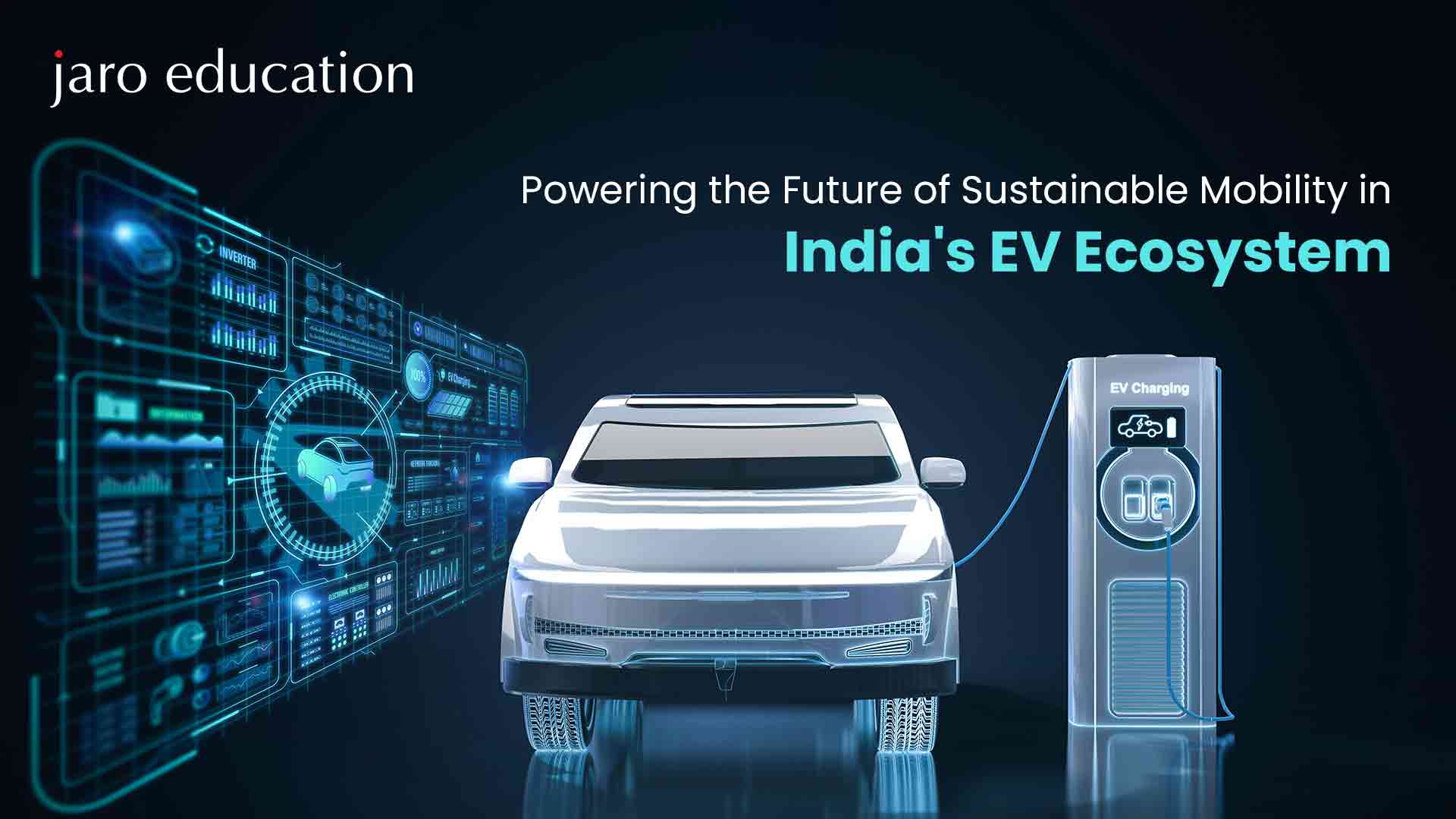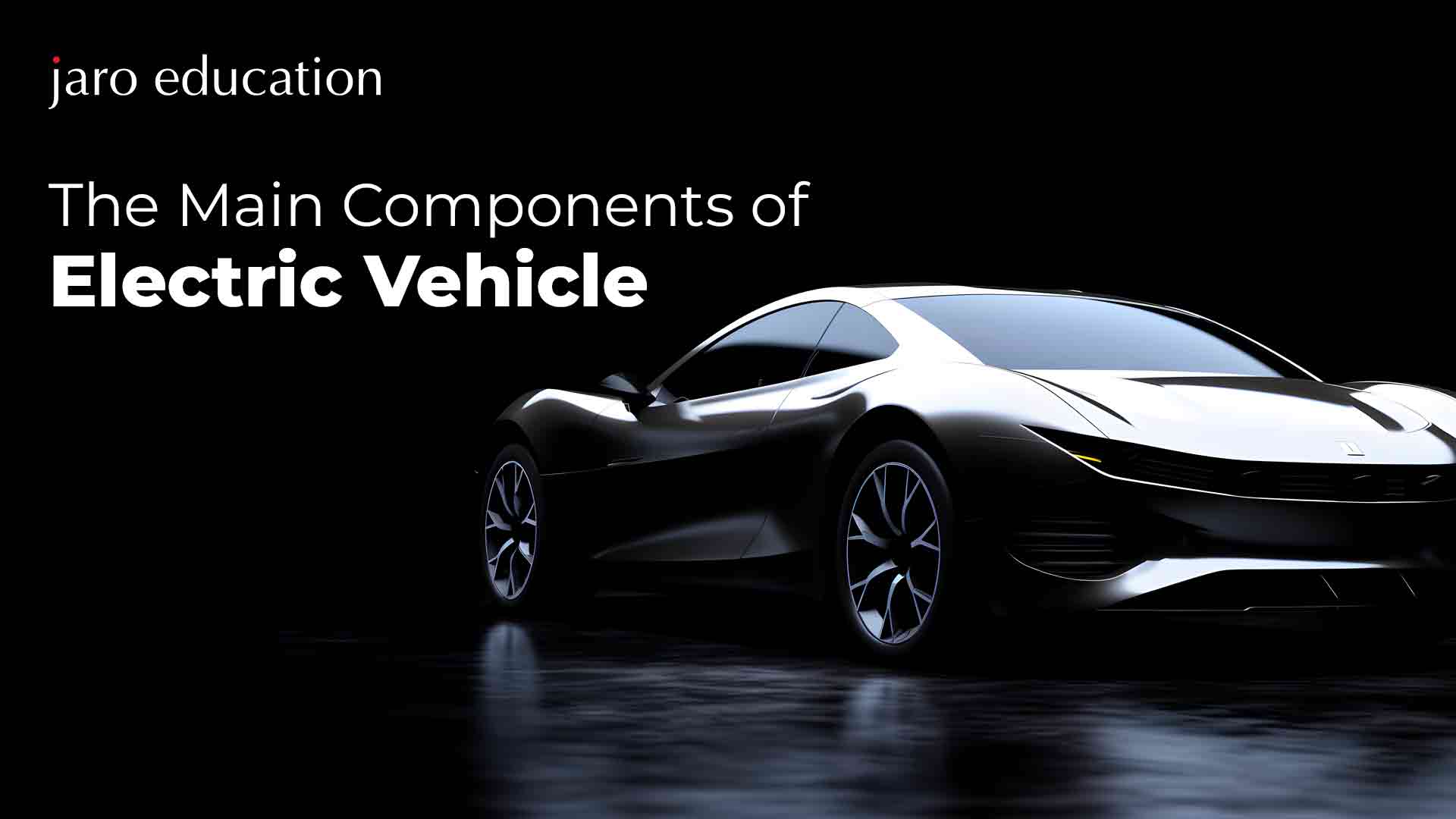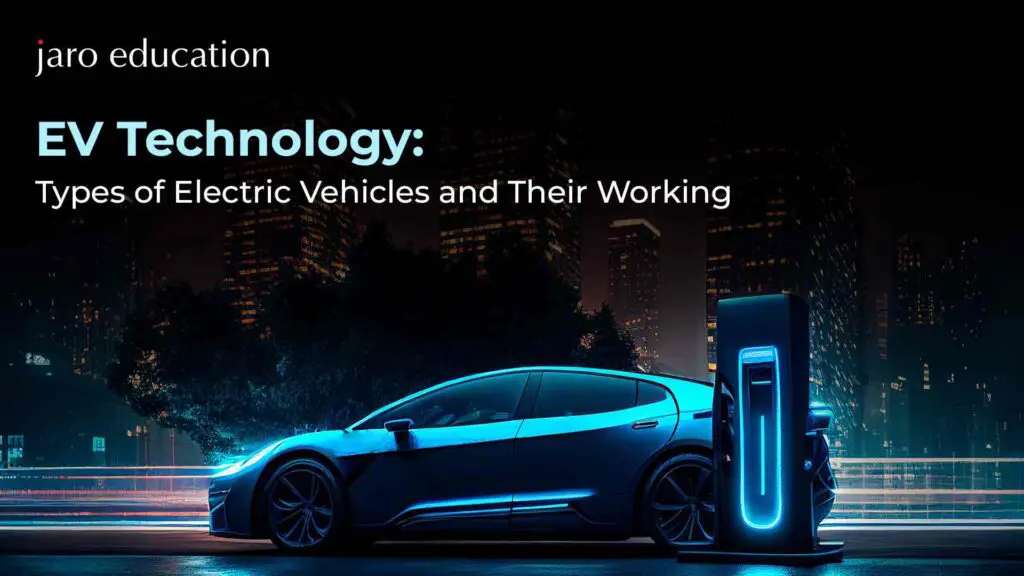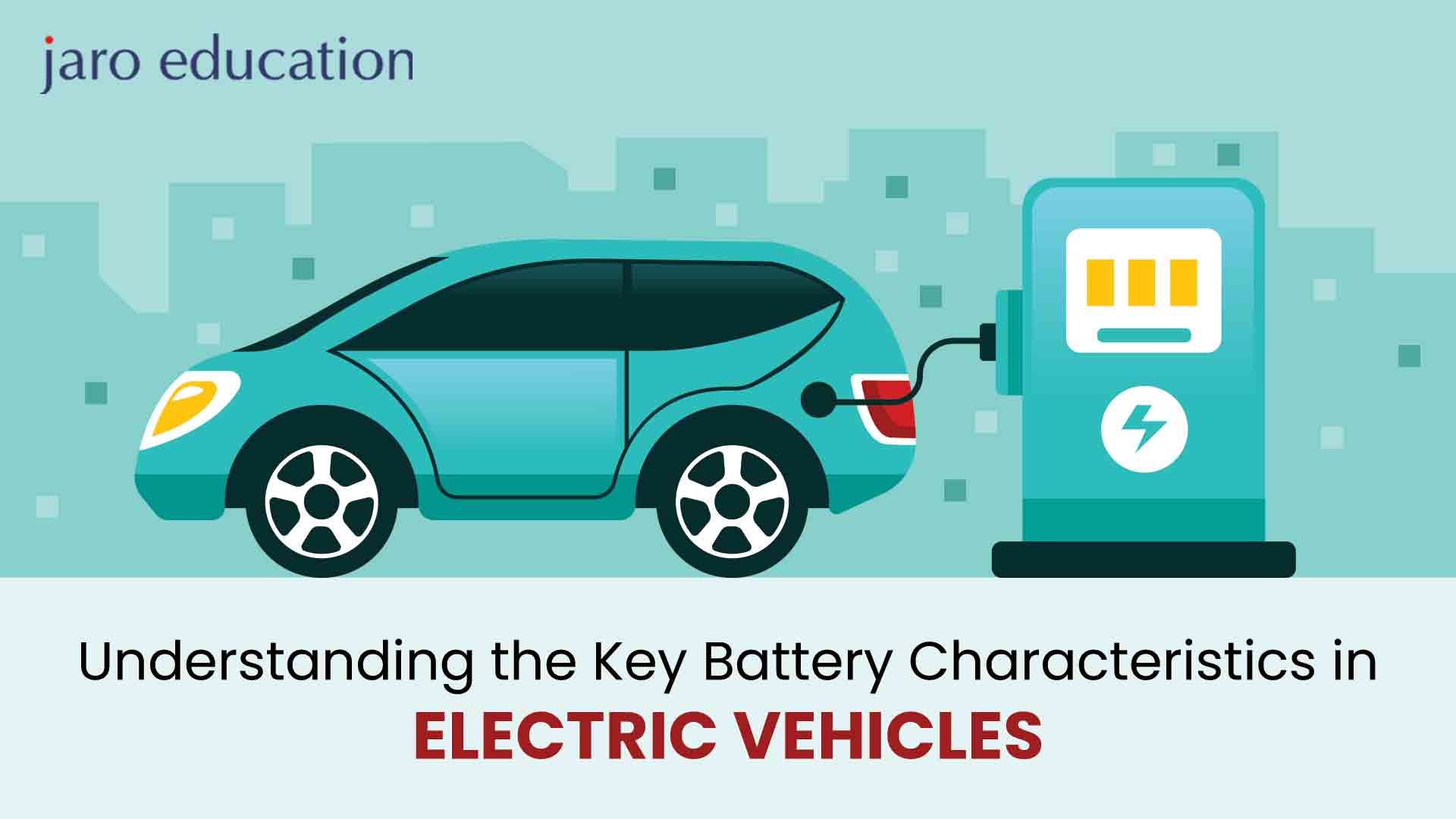
- jaro education
- 3, June 2024
- 10:02 am
Electric vehicles, also known as EVs, are becoming very popular. These vehicles create less pollution than gasoline-powered vehicles (or petrol cars), so they are environmentally friendly–especially in cities. Electric cars are usually made by transitioning regular cars that run on gas. Merely judging by its exterior, one cannot always ascertain whether a car is electric. The electric car uses energy stored in its rechargeable batteries, which are recharged by common household electricity. The battery is the fuel for electric vehicles. It’s an essential component in determining its performance, range, and overall efficiency. To gain a practical understanding, we’ll explore the different types of batteries used in electric vehicles, discuss their properties, and learn about the challenges and solutions in battery technology.
Function of Batteries in Electric Vehicles
Even if you have never driven an electric car, identifying its main parts is still relatively simple. For example, instead of engines, they have an electric motor, and instead of a gas tank, they have batteries.
Electric vehicles operate differently than traditional gasoline-powered vehicles as they do not require IC engines to operate. It’s powered by an electric motor rather than a petrol engine. The electric motor gets energy from the controller, which regulates the amount of power used by the driver’s accelerator padel.
Table of Contents
The battery used in electric vehicles functions as an electrical energy storage system in the form of direct current electricity. If it receives a signal from the controller, the battery transmits DC electrical energy to the inverter and then uses it to drive the motor. The type of battery used is a rechargeable battery arranged in such a way that it is called a traction battery pack.
Types of Batteries Used in Electric Vehicles
These are the three most common EV battery types:
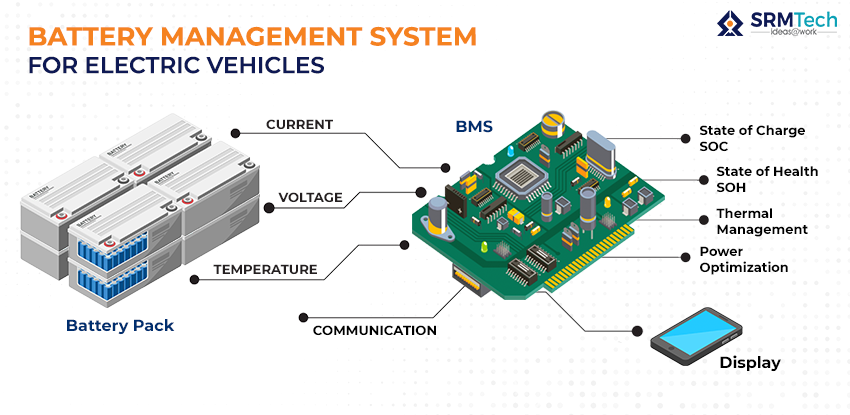
1. Lithium-ion Batteries
Lithium-ion batteries are the most common type of batteries used in electric vehicles today. They offer high energy density, meaning they can store much energy in a relatively small and lightweight package. This allows electric vehicles to achieve longer driving ranges on a single charge. Lithium-ion batteries have a longer lifespan than other types of batteries, making them a preferred choice for electric vehicle manufacturers.
2. Nickel-Metal Hydride Batteries
Nickel-metal hydride (NiMH) batteries were once popular in early electric vehicles but have since been primarily replaced by lithium-ion batteries. NiMH batteries offer decent energy density and are relatively inexpensive compared to lithium-ion batteries. However, they have a lower energy density and shorter lifespan, making them less efficient and cost-effective in the long run.
3. Lead-acid Batteries
Lead-acid batteries are the oldest type of rechargeable battery and are commonly used in conventional gasoline-powered vehicles. While they are not typically used in modern electric vehicles for their low energy density and heavyweight, lead-acid batteries are still found in some hybrid electric vehicles (HEVs) as part of the auxiliary system or to supplement the main battery pack.
Key Characteristics of Battery in Electric Vehicles
Now that you know about the EVf battery types, it’s crucial to understand their key characteristics for optimising performance and addressing challenges.
Energy Density
Energy density is an important element in electric car batteries, as it shows the amount of energy stored per unit of volume or weight. In other words, batteries with higher energy density can store more energy in a smaller and lighter package. This helps electric vehicles to drive further on a single charge. Lithium-ion batteries, with their high energy density, have made a big difference in electric cars. They let cars travel longer distances without needing to charge often.
Specific Power
Specific power measures the rate at which a battery can deliver energy to the electric motor. It is an essential characteristic of electric vehicles, as it determines the vehicle’s acceleration and overall performance. This is pivotal for electric cars because it affects how fast they can speed up and their general working ability. Batteries with higher specific power provide greater energy per unit of weight, resulting in faster acceleration and improved driving control. This allows electric cars to compete with traditional internal combustion engine vehicles in terms of speed and reaction.
Lifespan
Battery lifespan refers to the number of charge-discharge cycles a battery can endure before its capacity degrades to a certain level. A longer lifespan is great for electric car owners because it means they don’t have to replace batteries as often, which saves money on maintenance. Advances in battery tech, like better materials and management systems, have made lithium-ion batteries last much longer. This makes them more dependable and cheaper to use in electric cars.
Charge-Discharge Efficiency
Charge/discharge efficiency shows how much energy a battery can give compared to how much it needs to charge. If it’s high, it means less energy is wasted when charging or using the battery. This makes electric cars more efficient, letting them go further on one charge. Making charge/discharge efficiency better is key to getting the most out of electric car batteries in terms of energy and performance.
Dependence on Temperature
Temperature affects how well batteries work. They perform best between 20°C and 40°C. Extreme temperatures can reduce battery performance, impacting charging speed, efficiency, and reliability. Electric cars have systems to control battery temperature and make sure they work well in different temperatures. Battery makers also use special charging methods depending on the temperature to make batteries last longer and work well for the car’s life.
Safety
Safety is important in electric car batteries because it can lead to severe consequences if something goes wrong. Lithium-ion batteries, in particular, can pose a fire hazard or overheat if not properly maintained. To prevent problems, manufacturers add safety features to batteries, like temperature sensors and systems that watch how the battery works. They also follow the rules and guidelines of regulatory agencies to ensure batteries are safe to use. These rules cover how batteries are made, tested, and approved–ensuring people using electric cars stay safe and confident.
Challenges and Solutions in Battery Technology
There are several challenges in battery technology, and overcoming them can help accelerate the transition to electric vehicles as a sustainable mode of transportation.
Range Anxiety and Current Solutions
A major concern for electric vehicle drivers is range anxiety–the fear of running out of battery power before reaching their destination. To tackle this challenge, electric vehicle manufacturers are constantly enhancing battery technology to increase driving ranges. They’re also improving charging infrastructure to support longer journeys by adding more charging stations along popular routes. Additionally, advancements in energy management systems and predictive algorithms are being implemented to optimize battery usage and provide accurate range estimates to drivers, giving them greater confidence in their electric vehicles’ capabilities.
Environmental Impact and Recycling of Batteries
Electric vehicle batteries bring environmental challenges from start to finish. While electric cars emit fewer emissions during operation, the environmental impact persists in the production, usage, and disposal of batteries.
To make lithium-ion batteries, factories must excavate and process materials, which can cause pollution and use up resources. Plus, batteries are tricky to recycle and dispose of because they have dangerous components inside.
However, researchers are working on finding solutions to these problems. They’re looking for better materials and ways to make batteries that are kinder to the environment. They’re also improving how batteries are recycled to reduce waste and save resources.
The Future of Battery Technologies
The future of electric car batteries looks bright. Scientists and engineers are working hard to make batteries better in lots of ways. They are exploring new chemicals, materials, and production methods to enhance battery durability, accelerate charging times, and reduce costs.
New types of EV batteries, like solid-state and lithium-sulfur batteries, could change how electric cars work in the future. If there are big improvements in battery tech, like making them last longer, charge faster, and cost less, more people might buy electric cars. This would make electric cars more popular and make our transportation system cleaner and better for the environment.
Conclusion
In summary, electric vehicle batteries play a pivotal role in shaping the future of transportation. Understanding the different types of batteries used in EV vehicles and their key characteristics becomes essential for better performance, efficiency, and sustainability of electric vehicles. By harnessing the power of batteries, we can create a greener, cleaner, and more sustainable future for generations to come.
As consumer demand for electric vehicles continues to grow, the automotive industry is all set for a transformative shift towards electrification. If you want to gain an all-round understanding of electric vehicle technology, enroll in the Advanced Programme in Electric Vehicle (EV) Technology by CEP, IIT Delhi and stay one step ahead in your career. The cutting-edge curriculum designed by the faculty of IIT Delhi, will give you in-depth knowledge and practical skills in Electric Vehicle (EV) Technology. Whether a fresh graduate or a working professional, this 6-months online training programme will equip you with valuable industry insights, helping you stand out in your career.

